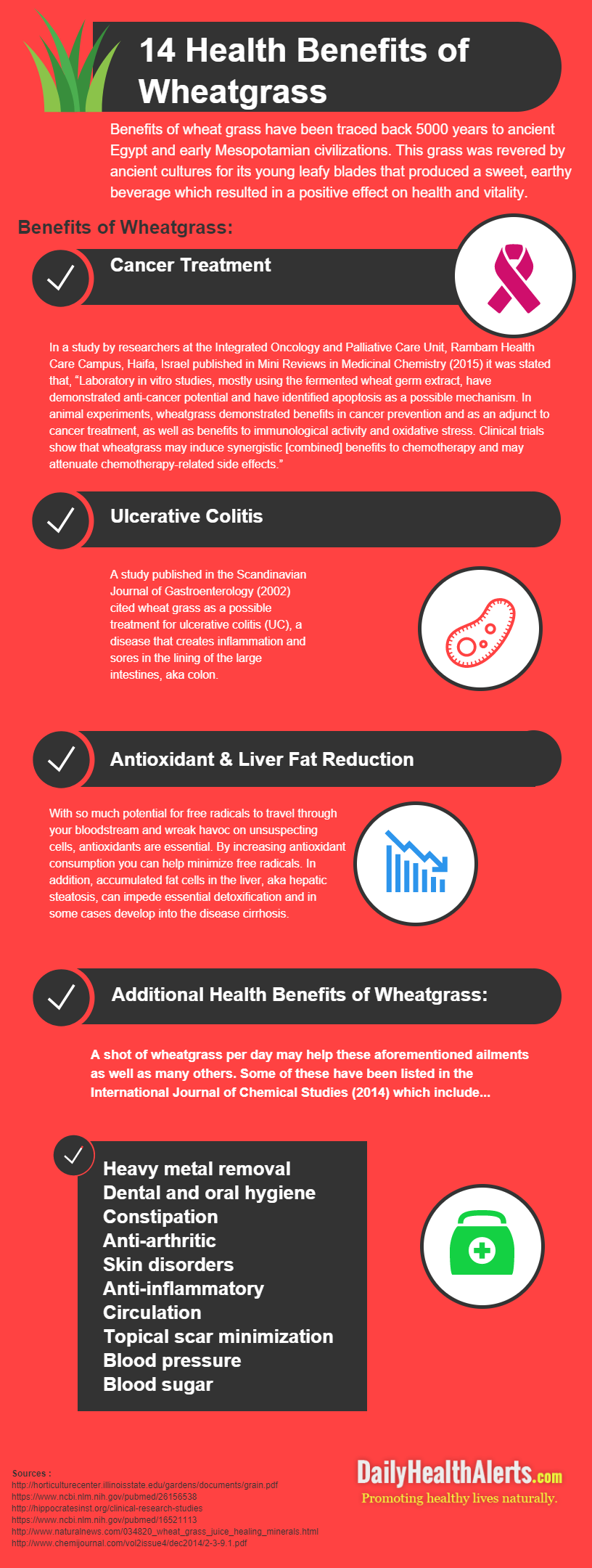You may have seen those trays of green flowing grass in a health food store or farmer’s market. The one’s where someone snips a bunch of grass off and then stuffs piles of it into what looks like a mini meat grinder. The grass is then transformed into a deep green liquid with a pale green pressed grass tail slowly pushing out of the side of the grinder. Then, the liquid which has flowed into a plastic shot glass, is gulped down for what some believe enhances health.
This is wheat grass, and the benefits of wheat grass have been traced back 5000 years to ancient Egypt and early Mesopotamian civilizations. This grass was revered by ancient cultures for its young leafy blades that produced a sweet, earthy beverage which resulted in a positive effect on health and vitality.
Find out how these 14 benefits of wheat grass could benefit you. It just may be a simple, healthy way to avoid conventional pharmaceuticals and stay on top of your game.
Wheat grass had an unexpected health discovery by one clever chemist that started its rise as an American alternative health remedy. According to the The Nutraceutical Garden by Kent Seymour, posted by Illinois State University,
“The consumption of wheatgrass in the Western world began in the 1930s as a result of experiments by Charles F. Schnabel and his attempts to popularize the plant. Schnabel, an agricultural chemist, conducted his first experiments with young grasses in 1930, when he used fresh cut grass in an attempt to nurse dying chickens back to health. The hens not only recovered, but they produced eggs at a higher rate than healthy hens. Encouraged by his results, he began drying and powdering grass for his family and neighbors to supplement their diets. The following year, Schnabel reproduced his experiment and achieved the same results. Hens consuming rations supplemented with grass doubled their egg production. Schnabel started promoting his discovery to feed mills, chemist and the food industry.”
Since the discovery of the benefits of wheatgrass on chickens, many studies have confirmed its effects on humans, just as Charles Schnabel encouraged.
In a study by researchers at the Integrated Oncology and Palliative Care Unit, Rambam Health Care Campus, Haifa, Israel published in Mini Reviews in Medicinal Chemistry (2015) it was stated that,
“Laboratory in vitro studies, mostly using the fermented wheat germ extract, have demonstrated anti-cancer potential and have identified apoptosis as a possible mechanism. In animal experiments, wheatgrass demonstrated benefits in cancer prevention and as an adjunct to cancer treatment, as well as benefits to immunological activity and oxidative stress. Clinical trials show that wheatgrass may induce synergistic [combined] benefits to chemotherapy and may attenuate chemotherapy-related side effects,”
A study published in the Scandinavian Journal of Gastroenterology (2002) cited wheat grass as a possible treatment for ulcerative colitis (UC), a disease that creates inflammation and sores in the lining of the large intestines, aka colon. It stated that,
“Treatment with wheat grass juice was associated with significant reductions in the overall disease [ulcerative colitis] activity index and in the severity of rectal bleeding. No serious side effects were found. Wheat grass juice appeared effective and safe as a single or adjuvant treatment of active distal UC.”

With so much potential for free radicals to travel through your bloodstream and wreak havoc on unsuspecting cells, antioxidants are essential. By increasing antioxidant consumption you can help minimize free radicals. In addition, accumulated fat cells in the liver, aka hepatic steatosis, can impede essential detoxification and in some cases develop into the disease cirrhosis.
Consuming wheatgrass may help both of these issues according to a study reported by Natural News. This study also describes the best wheatgrass choice stating,
“The capacity to absorb free radicals (Oxygen Radical Absorbance Capacity – ORAC) was observed, using both aqueous (water-based) and ethanol (alcohol-based) extracts. The most potent wheat grass extracts were those which were 1) alcohol-based, 2) the wheat grass had grown for fifteen days before harvesting, and 3) the wheat grass had grown in soil with nutrients. Not only did this type of wheat grass extract have impressive antioxidant properties, it also significantly reduced fat (lipid) cells in rat liver mitochondria. The ORAC value for both alcohol and water-based wheat grass extract was found to be higher than that of many other vegetables or extracts.”
A shot of wheatgrass per day may help these aforementioned ailments as well as many others. Some of these have been listed in the International Journal of Chemical Studies (2014) which include,
So saunter over to support your nearest mom and pop health food store or, if you must, use a big box retailer like Whole Foods and try some wheatgrass. Full disclosure, the taste is grassy but in time you’ll get used to it. If you’re so inclined, you can swish it around your mouth for dental hygiene support or just down it like you’re at a healthy shot bar. There are wheatgrass supplement pills which are a good choice but obviously not as potent as the fresh pressed juice.
Either way, it takes about twenty-one days to for any alternative remedy change to take effect. So give it time and then see if any of these 14 health benefits of wheatgrass may help you up your game to the optimal health you deserve.